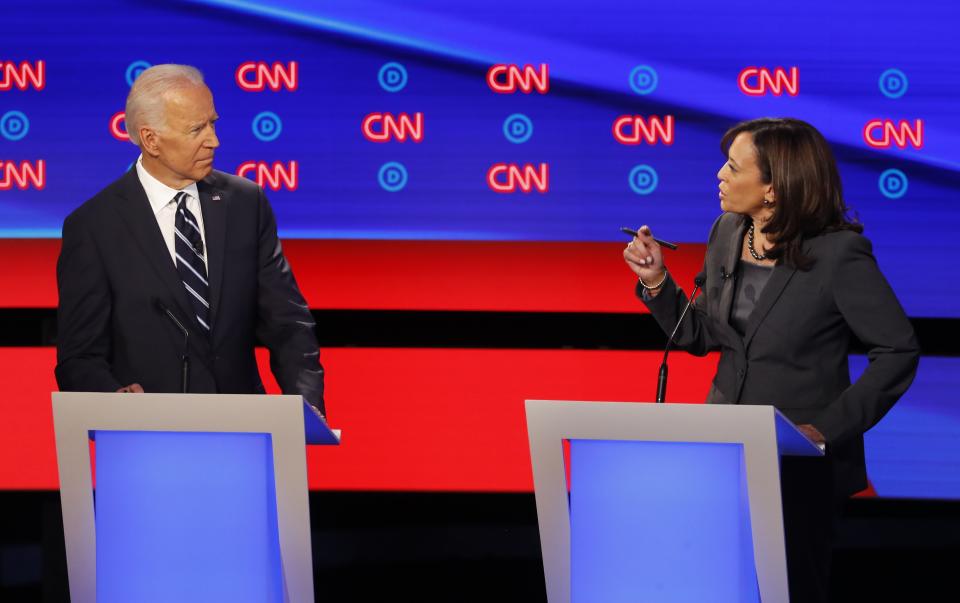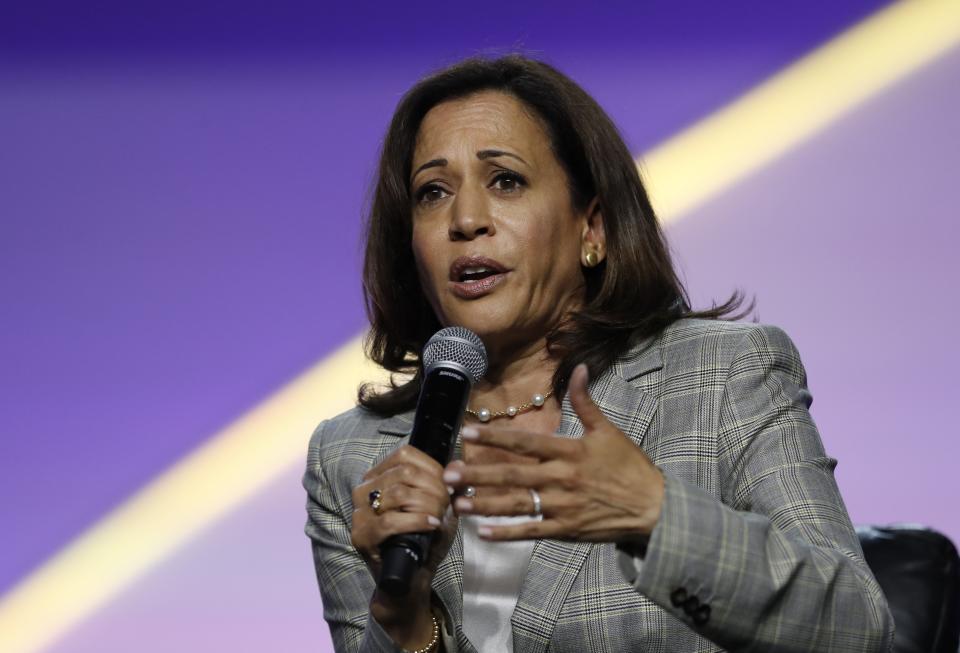'It is immoral:' Why Kamala Harris went after Joe Biden on health care
Health care was arguably the most-talked about topic during the latest round of the Democratic presidential debates. Out of the 24 Democratic presidential candidates, 14 of them support some type of Medicare for all, including Sen. Kamala Harris (D-CA).
Just two days before the debate, Harris released her Medicare for all plan. One component that sets hers apart from others is the role her plan leaves for private insurance. People would have the option to either purchase Medicare plans from private companies or buy government-administrated Medicare plans.
“Let’s talk about math,” Harris said during the debate. “Let’s talk about the fact that the pharmaceutical companies and the insurance companies last year ... profited $72 billion, and that is on the back of American families.”
Harris didn’t shy away during the debate from going after fellow candidate Joe Biden, and his health care plan.

Biden’s plan, which some have dubbed Obamacare 2.0, builds off of the Affordable Care Act. It keeps popular components in place, including protections for those with pre-existing conditions and Medicaid expansion. It allows Medicare to negotiate drug prices and also creates a government-run public insurance option.
“I understand the appeal of Medicare for All — but folks supporting it should be clear that it means getting rid of Obamacare,” Biden wrote on Twitter. “And, I’m not for that. We should protect and build upon the Affordable Care Act and the progress we’ve made. Not tear it down and start over.”
Harris didn’t seem impressed by the plan during the debate.
“Under your plan, status quo, you do nothing to hold the insurance companies to task for what they have been doing to American families,” she said. “In America today, diabetes patients, 1 in 4 cannot afford their insulin. In America today, for those people who have overdosed from an opioid, there is a syringe that costs $4,000 that will save their life.”
CNN fact-checked Harris’s statement that pharmaceutical and insurance companies profited $72 billion last year, and it found she was actually understating the profits of these two industries. In 2018, health insurance companies made $23 billion, while 10 of the biggest U.S.-based drug companies along made $69 billion.
Despite Harris’s critique of the insurance industry, her plan would still allow employer-based coverage, as long as those plans meet government-approved criteria and get certified as Medicare plans.

The syringe that Harris was likely referring to in her comments to Biden is naloxone — an opioid overdose reversal drug. The average retail price for a package containing two units of a syringe is $4,641 (the nasal spray costs an average of $142, however). The price of the drug has increased steadily as drug overdoses continue to rise.
Under her plan, Harris would “institute a serious audit of prescription drug costs to ensure pharmaceutical companies are not charging more than other comparable countries,” according to her Medium post.
But how would Harris pay for her Medicare for all plan?
The senator agrees with several aspects of Bernie Sanders’s Medicare for all plan, particularly the “income-based premium paid by employers, higher taxes on the top 1%, [and] taxing capital gains at the same rate as ordinary income.” However, Harris wants to exempt households that make below $100,000 and set a higher income threshold for middle-class families living in high-cost areas.
In order to make this possible, she proposes: a 0.2% tax on Wall Street stock trades, a 0.1% tax on bond trades, and a 0.002% tax on derivative transactions. Additionally, Harris states she would tax offshore corporate income at the same rate as domestic corporate income.
U.S. health care spending grew 3.9% in 2017, reaching $3.5 trillion or $10,739 per person, according to the Centers for Medicaid and Medicare Services (CMS). That accounts for about 17.9% of the nation’s GDP.
Fed Chair Jerome Powell even touched upon this issue while testifying in front of the Senate Banking Committee.

“The U.S. federal government is on an unsustainable fiscal path. … The thing that drives our single unsustainability is health care spending,” he said back in February. “We spend 17% of GDP, everyone else spends 10%. … It’s not that benefits themselves are too generous. We deliver them in inefficient ways.”
Voters aren’t blind about this issue, either. An April Gallup poll indicated that health care is the top worry among Americans. Out of 1,039 American adults, 55% said they worry a “Great deal” about health care affordability and health care. About 25% indicated a “Fair amount” and 21% stated only a “Little/not at all.”
While politicians scramble to find an effective solution to this health care crisis, everyday Americans have turned to means like crowdfunding to cover their medical costs.
“It is immoral,” Harris said. “It is untenable. And it must change with Medicare for all.”
Adriana is an associate editor for Yahoo Finance. Follow her on Twitter @adrianambells.
READ MORE:
Health care CEO: Medicare for all 'would just collapse the system'
GoFundMe CEO: The U.S. health care system 'is really broken'
CEO: One key thing needs to happen before U.S. considers universal health care
Read the latest financial and business news from Yahoo Finance
Follow Yahoo Finance on Twitter, Facebook, Instagram, Flipboard, SmartNews, LinkedIn, YouTube, and reddit.
